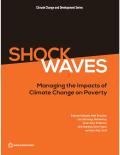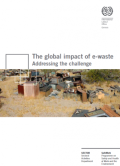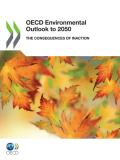
Climate change and climate policies will affect poverty reduction efforts through direct and immediate impacts on the poor and by affecting factors that condition poverty reduction, such as economic growth. This report explores the relation between climate change, climate policies, and poverty outcomes by examining three questions: the (static) impact on poor people's livelihood and well-being; the impact on the risk for non-poor individuals to fall into poverty; and the impact on the ability of poor people to escape poverty. The report explores various channels through which climate change and policies will affect poverty: economic impacts through incomes and prices; natural disasters and their effects on assets and livelihoods; and health impacts. It also investigates policy options to ensure adaptation and mitigation policies -- such as adaptive and well-targeted social protection, public investments, and financial inclusion policies -- contribute to poverty reduction and protect poor people against climate change impacts.

This paper proposes a simple index of economic progress that weighs in the monetary cost induced by climate change mitigation policies as well as the health benefits arising from the reduction in local air pollution. The shadow price of pollution is calculated indirectly through its impact on life expectancy. Taking into account the health benefits of mitigation policies significantly reduces their monetary cost in China and India, as well as in countries with large fossil-based energy-producing sectors (Australia, Canada and the United States).
This article describes a multidisciplinary study of market-based policies for controlling air pollution in China. While previous studies have examined the costs and benefits of pollution control separately, this approach determines them together using an economy–environment model for China. We employ air dispersion simulations and population maps to calculate health damages due to air pollution. This provides estimates of incremental damages for industry output and fuel use. Based on these marginal damages, we simulate the effect of “green taxes” on the economy and show that the environmental benefits exceed the aggregate costs, ignoring adjustment costs for individual sectors.

Based on joint modelling by the OECD and the Netherlands Environmental Assessment Agency (PBL), this document looks forward to the year 2050 to find out what demographic and economic trends might mean for the environment if the world does not adopt more ambitious green policies. It also looks at what policies could change that picture for the better. This Outlook focuses on four areas: climate change, biodiversity, freshwater and health impacts of pollution, identified as 'red light' issues by the previous 'Environmental Outlook to 2030' publication. This summary was prepared by Eldis.
